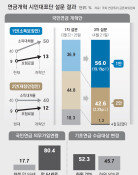Court to Settle School Law Revision Row
Court to Settle School Law Revision Row
Posted December. 29, 2005 03:01,
The controversy over the revised Private School Law that brought the National Assembly to a standstill will be settled by the Constitutional Court.
On December 28, 15 people, including officials from private colleges, private high schools, private middle schools, schools run by religious groups, and private school foundations filed a petition with the Constitutional Court, requesting that the Court rule whether the revised law breaches the constitution, because in their view, the revised law excessively violates the autonomy of private schools.
The nine provisions of the revised Private School Law that the petitioners pointed out as being in violation of the Constitution include provisions related to: independent board members; the cancellation of approval for an appointment of an executive and suspension of an executive; the appointment of a lecturer; the limits on chief directors and their relatives holding more than one office and limits on their appointing rights; temporary board members; and university councils.
Lee Suk-yeon, a lawyer who represents the petitioners, said, Even though private schools receive some assistance from the government or are supervised by competent authorities, the revised Private School Law runs against the spirit of the Constitution which guarantees a juridical foundations rights to private properties, because the law almost turns private schools into public corporate bodies.
At issue within the controversy over the Private School Law is which should come first or which should be considered superior among public interests that will be promoted through the law and private interests of school foundations that will be violated if the law is enforced.
Article 23 of the Constitution guarantees all peoples rights to properties (Clause 1), and at the same time, it emphasizes that exercising of ones property rights has influences on public interests, saying, An exercise of ones property rights should be done in a way that suits public welfare and interests (Clause 2). However, according to the Constitutional Court and judicial precedents, even if there is a need to restrict ones property rights for the sake of public interest, the restrictions should be kept at a minimum.
The ruling Uri Party, which pursued the revision of the law, argues that the provisions of the revised Private School Law are aimed at making management of private schools more democratic, making management of foundations more transparent, and making our education more public.
Some from legal circles, who consider the revised law to be constitutional, argue, Private schools are educational institutions. What it means is that they have bigger influences on public interests than private companies. Not only that, even though the independent board member system is introduced, it is not likely to undermine the basis of management rights of private schools, because the number of independent board members is short of the quorum, which is more than half of the number of board members.
However, the petitioners argue that public interest that can be promoted through the revised law neither comes first, nor is superior to private interests that are liable to be violated, and that the law will end up undermining the market economy and principles of liberal democracy.
Their argument goes, even if the influences of the private schools on public interests are taken into account, the nation should not go further than assisting foundations in pursuing their educational objectives, and supervising them so that they do not deviate from those objectives. They argue, if the nation goes beyond those roles, it will constitute the overstepping of authority and will violate property rights, as well as the autonomy and political neutrality of education.
The petitioners argue that although there are some private schools that are tainted with corruption, those schools can be dealt with by applying the existing laws.
Therefore, their argument goes, the revised Private School Law runs counter to the principle of optimum intervention enshrined in the Constitution. They argue it also violates the appropriateness of a method and the balance of legal interests.
Lawyer Lee said, The existence of private schools depends on whether their autonomy based on self-rule is guaranteed or not, adding, There should be obvious limits to the impingement of private properties for the sake of public interest.
jin0619@donga.com







